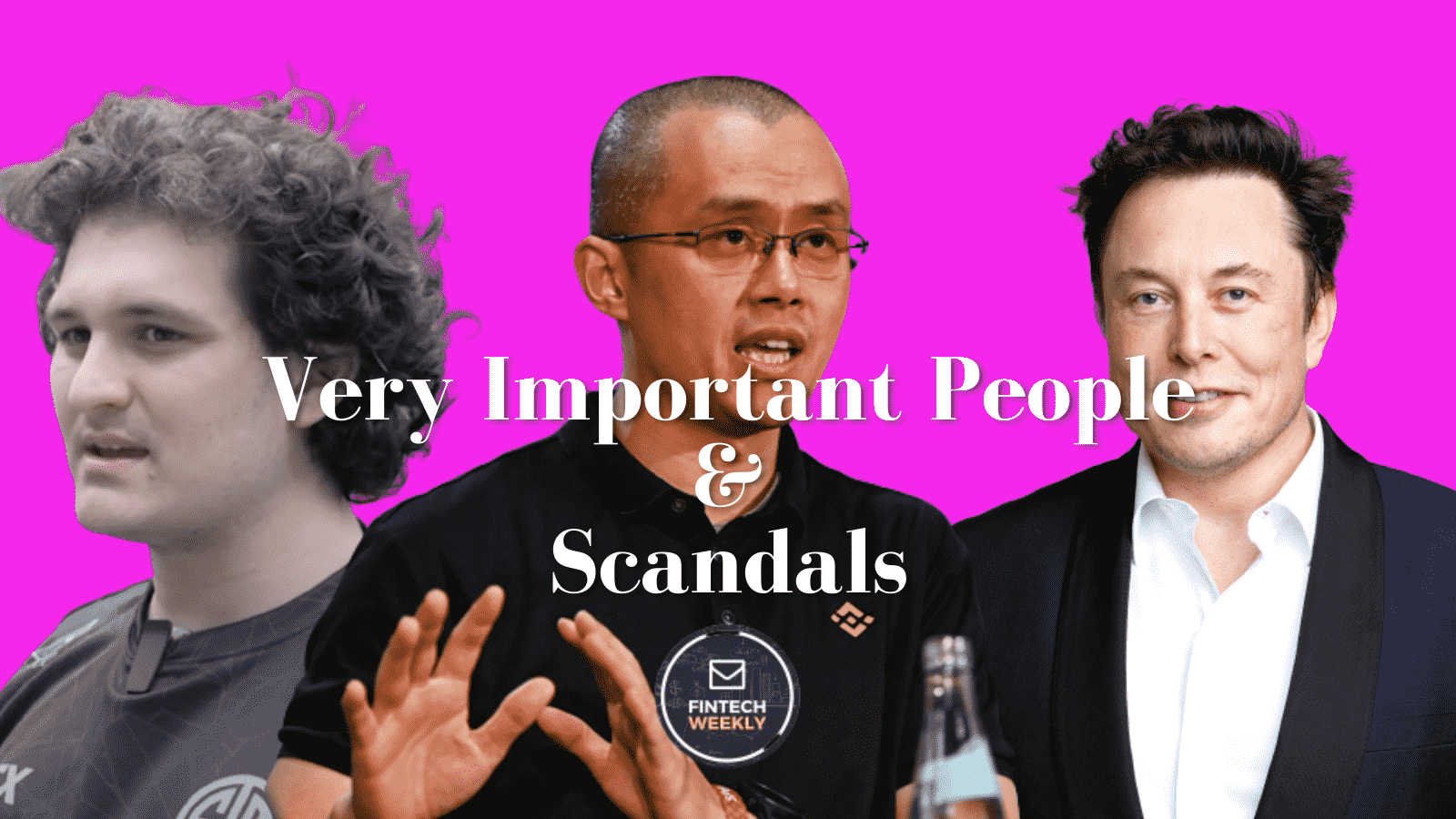Issue #394 - Very Important People & Scandals December 15th, 2022

Sam Bankman-Fried and Changpeng Zhao made headlines the past week: both founders were involved in some “scandals” – even if in different ways.
After the dramatic collapse of FTX, Bankman-Fried was arrested in the Bahamas and has to face US regulators. Nevertheless, he keeps saying that Zhao played him and that the collapse was mainly due to a lack of concentration. In the meantime, the founder and CEO of Binance, Changpeng Zhao, has to defend Binance – the largest crypto exchange in the world: after a recent audit, investors discovered that the platform does not have enough reserves to cover people’s investments.
Also Elon Musk could be in trouble: after the announcement that he wants to turn Twitter into a payment platform, US regulators are working on an act that can reduce the freedom of companies that want to offer banking services without being banks.
Scandals in the crypto space continue, with many companies facing the tough financial situation of the market.
Fintech is still strong, with many companies and startups looking for solutions that can mitigate the strong effects of a global economic crisis and high inflation.
This and much more in this number of FinTech Weekly, the free newsletter that help you stay on top of fintech business solutions and conferences.
Top Stories
Sam Bankman-Fried, the founder of collapsed FTX, during a recent interview with Forbes said that he was played by Changpeng Zhao, the founder of Binance. Moreover, he said that the collapse of the crypto exchange was mainly due to his lack of concentration.
Changpeng Zhao has now to defend Binance, but not because of Bankman-Fried. After the audit run by Mazars, it was found that the company doesn't achieve the 1:1 ratio to cover all customers' funds with reserves. This caused uncertainty - it would be better to say FUD (Fear, Uncertainty, Doubt) - among investors.
Senate Banking Chairman Brown to introduce bill closing ‘shadow’ banking loophole after Elon Musk says Twitter will process payments
— via CNBCAbout a month after Elon Musk's plan to turn Twitter into a payment service platform, Sen. Sherrod Brown introduced a bill - the Close the Shadow Banking Loophole Act - to prevent tech companies from offering banking services without falling under the same regulatory framework as banks.
Top Events
AFF is Asia’s premier platform for global leaders in government, finance and business to exchange insights, intelligence as well as to explore business and investment opportunities. More than 66,000 viewers from 82 countries and regions had visited the AFF 2022 for thought leadership and business networking, and to experience the latest fintech innovations and next-generation business ideas.
Podcasts and Videos
Sam Bankman-Fried was arrested on Monday in the Bahamas, and it's likely he will be extradited. The founder of FTX and protagonist of the FTX scandal has now to testify before the House Financial Services Committee in the US.
Celsius Bankruptcy Developments; Grayscale Bitcoin Trust Discount Widens to Record High
— via CoinDeskCoinDesk, owned by Digital Currency Group - the same group that owns Grayscale Bitcoin Trust - reports that the largest bitcoin fund hit a record-high discount rate. In the meantime, the judge involved in the case of Celsius bankruptcy ordered the network to return $50 million to its users.
Crypto
Grayscale Bitcoin Trust is currently selling off faster than Bitcoin - the cryptocurrency that the fund owns. Even if this is generating for the fund fees worth $200 million per year, it's not necessarily good news for Bitcoin investors.
Banking
The Fed may rise interest rates once again to face inflation. During the next FOMC (Federal Open Market Committee), the Fed could announce rates between 5% and 7%. And it seems that the market doesn't believe that these rates will hold for all 2023.
The UK will go through the most significant revision of banking rules of the last 30 years. The package of reforms, called the "Edinburgh Reforms", will also review the rules introduced after the 2008 crisis, which required separate retail banking activities and riskier operations.
Innovation
Walmart has always been interested in fintech, and now it's backing a fintech startup called One. The startup is aimed at creating tailor-made BNPL (Buy Now, Pay Later) loans. One is also the proof of the cooperation between fintech and banking: One is managed by Omar Ismail, a former Goldman Sachs' executive.
Fintech
‘No surprise’ fintech partnerships are behind evolution of banking services
— via The Global TreasurerIn these messy times, banks and fintech companies are cooperating more to reach financial results for their clients. This decision might be a direct consequence of the competitive pressure felt by banks because of fintech firms.




















